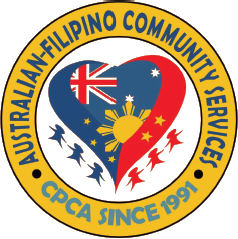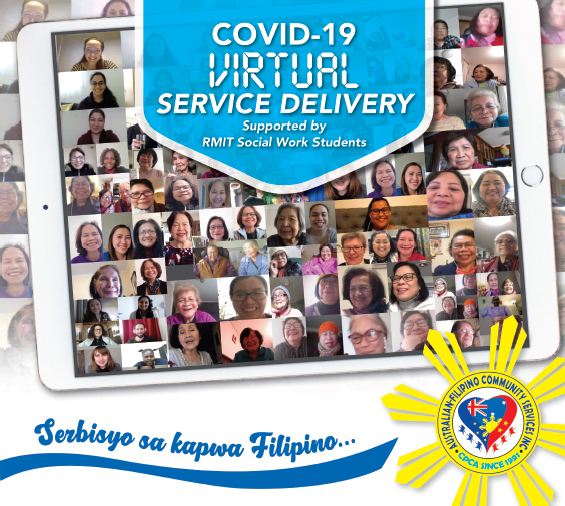6. Australian Filipino Community Services (AFCS): Mateship and Bayanihan Service Online
Norminda Forteza

“Bayanihan. Based on the words bayan and bayani, bayanihan means sama-samang pagpapakabayani. Bayanihan happens when ordinary people come together, in unity, to help a member of the community, the whole community, or the nation in times of crisis. These ordinary people do not expect to be celebrated as heroes” (Menguin 2021).
Mateship is similar to the bayanihan spirit that demonstrates brotherhood, equality, friendship, and solidarity. The Australian Filipino Community services, formerly known as the Centre for Philippine Concerns Australia Inc. (CPCA) was established in 1991. In the early years of the organisation, we provided settlement, women’s advocacy, youth sports, and community visiting to ageing Filipinos living in South Eastern Metropolitan Melbourne and Gippsland Region since its inception. The organisation’s initial work in tackling the issue of serial sponsorship of Filipino women coming to Australia is an achievement we are proud of. Australian and Philippine governments changed the immigration policy to curb serial sponsorship and protect Filipino women who were victims of the “mail-order-bride” modus operandi of abusive men from Australia. CPCA programs were a lifeline to many women needing support to escape family violence. We did not stop advocating for protection and provision of post arrival face-to-face information sessions. The progressive work of AFCS among young people, seniors and newly arrived migrants in the region gave the Filipino an open line for communication, social connection and “bayanihan” or “mateship”. Our vision is to provide leadership in developing proactive services for Australian Filipinos. We are committed to respond to people in need with compassion, charity and pastoral care; to offer welfare services to disadvantaged families and individuals, aged, vulnerable women and children. We linkup migrants to other agencies by active participation in the workforce, civic life, community education and volunteering as well as preserve the Australian Filipino cultural heritage. Year 2021 is a milestone year for our service to the community. Not only that we celebrated our 30 years of volunteering, we also celebrate the 75 years of diplomatic relations between Australia and Philippines. To Aussies, it is about “mateship”, to Pinoys it is about “bayanihan.”
The Covid-19 pandemic opened an opportunity for our RMIT student placement program to engage students. Due to lockdowns and restrictions, we had to reorganise. This crisis gave opportunity to students to roll their sleeves up and help our organisation. We offered online placements to provide wellness calls to clients who need social support during Covid-19 lockdown.
We had 15 students who helped us with:
- Updating our policy and procedures and develop a Covid-19 safe plan
- Implement Wellness calls daily to ensure older clients are connected
- Provided support to Social Support Coordinators using service coordination tool template
- Assisted in Online Physical exercise program
- International Student Survey development and implementation
- Art for Wellness program during the pandemic
Our Team organised online inductions to students. The topics we discussed were:
- Organisational structure, getting to know AFCS staff and volunteers
- Tour of AFCS Website
- “Within my walls” Video presentation about elder abuse
- Dementia Film and AFCS dementia awareness programs
- Presentation of Photos and Videos of Clients and programs of AFCS
Wellness Calls:
- Tips on proper greeting and addressing of clients the Filipino way
- Demonstration of Wellness Calls
- Practice with Students (break out rooms)
- Reflection meeting with peers
The RMIT Liaison meetings, the one-on-one meetings with students and their off site supervisors were very helpful because they helped the AFCS’s task supervisors understand the Australia Association of Social Work code of ethics and professional standards that govern student professional practice, the RMIT Social work Field education manual that provides the policies and procedures for student placements and the learning plan which provides the learning areas and tasks that students undertake during their placement. The meetings also helped in clarifying issues with online placements and gave direction and redirection as needed. The discussions among liaison officer/off site supervisors and RMIT provided support and encouragement to manage the impact of the pandemic in the field placement program. There is a lot of cultural respect in these meetings and it has strengthened the partnership at a time when it is very difficult to engage clients, students, and other service providers. These conversations are supportive, RMIT staff listened and provided insights when issues during placement became challenging.
Our work during the pandemic
Due to Covid-19, necessary changes were made to our programs to make access safe. All RMIT students assisted in these activities.
Daily prayer vigil online
We embraced Facebook Messenger to connect online and provide opportunity to seniors to talk to each other and share their concerns. Through these vigils, AFCS reached people ranging in age from 65 to 94 years of age. There is even singing. It was a wonderful way not only to observe faith in action but also helped foster connection in the community. “We combat social isolation and address the fears of our members while putting out up to date information. But it is not without its challenges. The challenges included that only eight participants at a time can participate, more volunteers are required as mentors, participants not having the necessary technology to connect virtually. However, there was also opportunities online that did not exist in a traditional service such as the use of music now, as well as access to exercise videos on YouTube.
Delivering essential goods to isolated seniors
The AFCS and its students have worked tirelessly to contact our clients individually while our frontliners delivered food and essential supplies to some of the most vulnerable members of our community. This work has been life–saving for many. The Minister for Prevention of Family Violence, Gabrielle Williams was delighted to acknowledge and support the AFCS and RMIT Students for the work they undertook during lockdown. The AFCS was provided with significant funding through the Andrews Labor Government’s CALD (Culturally and Linguistically Diverse) Communities Taskforce, which was established in response to Covid-19. We reached out to metropolitan and regional areas of Shepparton, Gippsland, Geelong and Ballarat. “This funding allowed the AFCS to focus on addressing matters most pertinent to the Australian–Filipino community, including the provision of emergency relief and the communication of health information in language. As a community we are experiencing an unprecedented period of unique and extreme challenges. It is heartening to see organisations like AFCS rising to these challenges and playing a vital role on the ground, to help understand and address the needs of our multicultural communities,” Minister Willliams said. During our 29th AGM (Annual General Meeting held virtually, she highlighted the work of RMIT Master of Social Work students for their efforts in helping conduct wellness calls to isolated Filipinos in her recorded message.
The main activities we offered online are:
Physical Exercise Program– with the support of social work students, we have reshaped the delivery of centre-based social support and it has now become an online physical exercise program led by a Filipino physiotherapist.
Art for Wellness program was supported by RMIT student online with 6 sessions of art discussions and its benefits on mind, body and soul.
Social work students assisted in developing Online Singing Program and narrative story-telling to encourage seniors to share their love for singing and release the Covid-19 stress. Providing health information and communicating to Filipinos the importance of getting tested, getting vaccinated and follow the Chief Health Officer’s guidelines during lockdowns were key service activities on the frontline as well as behind the scenes.
As our work continues, support of RMIT Student placement program remains steady. This has become a vital part of our operations on daily basis. From 15 students, we have narrowed to three students to focus on special needs projects and research because of our first substantial number of placements.
As a Chaplain, I find it rewarding to share a message of hope to all our staff, volunteers students and families during these trying times. Allow me to share with you a Scripture passage to remind us that we will get through this together: “We are hard pressed on every side, but not crushed; perplexed, but not in despair….struck down, but not destroyed.” (2 Corinthians 4:8-12, NIV).
Have faith in the Almighty. Celebrate humanity.
“Kumusta ka?” How are you? This is what RMIT students greet their Filipino clients during wellness calls and to inform them that their groceries are being delivered as they speak.

Image 5 Australian Filipino Community Services General Meeting © Australian Filipino Community Services.
This image is used in this book with the permission of Australian Filipino Community Services and is not to be reproduced without permission. For more information, go to https://www.afcsvictoria.org.au/.

